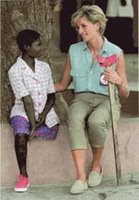 I had the good fortune this week to read a wonderful book proposal about development work, and more specifically the "desire for development," particularly among white women in the North.
I had the good fortune this week to read a wonderful book proposal about development work, and more specifically the "desire for development," particularly among white women in the North. The focus is on Canadian aid workers in sub-Saharan Africa, and the ways in which their investment in their work (and even their resistance) enables their self-constitution as moral subjects. The manuscript includes the following marvellous quotation about the ways in which the assumption of global difference constructs and confirms a sense of moral purpose in Canada above all:
A Canadian today knows herself or himself as someone who comes from the nicest place on earth, as someone from a peacekeeping nation, and as a modest, self-deprecating individual who is able to gently teach Third World Others about civility. (Sherene Razack, Dark Threats and White Knights 9)This is another approach to the problems I've mentioned before inherent in the self-proclaimed mission to teach "global citizenship".
The manuscript also notes something that surprised me, but probably shouldn't have, that "there are likely more expatriate development workers operating in Africa at this point than there were ever colonialists in the era of empire" (cf R L Stirrat, "Cultures of Consultancy," Critique of Anthropology 20.1 [2000]: 31-46).
No comments:
Post a Comment